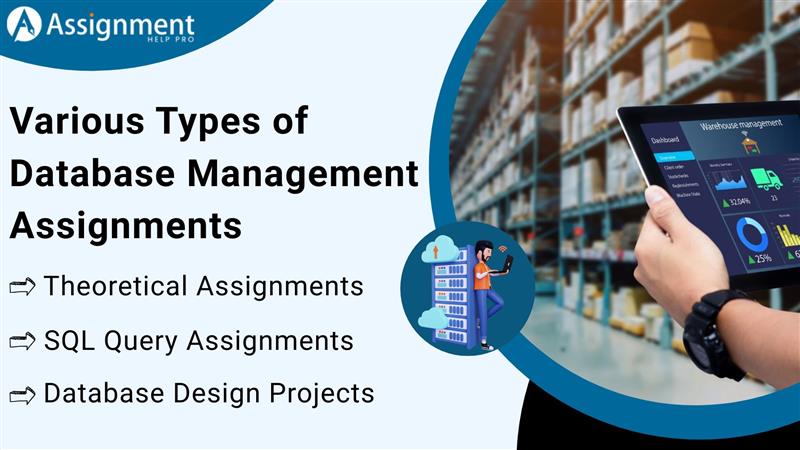Database management is the process of storing, organizing, and accessing data efficiently through Database Management Systems (DBMS). Learning the basics of database management will make it easy for you to effectively write your assignments on SQL, Normalization, etc. When it is tough for you to do your project, you can get database management assignment help online.
In today’s world of technology and business, database management plays a big role in helping systems run smoothly across all industries. Whether it is saving customer details on an online shopping site or tracking product stock in a store, with the help of databases, businesses make better decisions and work more efficiently. Considering the significance of data and databases, the universities have included database management as a subject in the curriculum of IT, Computer Science, Business, and Data Science-related courses. If you are a student studying any of these courses, then you will be asked to work on different types of database management assignments. Generally, knowing the fundamental database management concepts like data Models, SQL normalization, relational databases, and more will help you easily handle your projects and academic tasks.
When it is challenging for you to do your database management project, you can get online assignment help from a subject expert or read this blog. Here, we have shared the fundamentals of database management. Also, we have discussed various kinds of database management assignments and the effective ways to handle them.
What is Database Management?
Database management is the organized way of creating, storing, and managing data. This is done with the help of a system called a Database Management System, or DBMS. The DBMS connects users to the database and makes it easy to access and work with the data. Mainly, to retrieve, update, and manage data within the database, the Database Administrators (DBAs), developers, and end users should use the Structured Query Language (SQL).
Some common types of database management systems include
- Relational DBMS (RDBMS) – MySQL, PostgreSQL, Oracle
- NoSQL Databases – MongoDB, CouchDB
- Cloud-based Databases – Amazon RDS, Google Cloud SQL
Database management is essential for keeping data accurate, secure, and easily accessible. It supports better decision-making and smooth data sharing and reduces costs by minimizing redundancy. Overall, it improves efficiency and protects sensitive information.
Types of Databases
If you are a beginner in learning about databases, then you must know their types and what they are used for. These are common types of databases
- Relational Database: It stores data in tables with rows and columns. To access it, you should use SQL. It works well for organized data, like in banking or business systems.
- NoSQL Database: It handles unstructured or partly structured data, such as JSON files. NoSQL databases are flexible and good for big data and real-time apps.
- Cloud Database: It runs on cloud services like AWS or Google Cloud and typically offers easy access, scalability, and reliability.
- Object-Oriented Database: It stores data as objects, similar to how object-oriented programming works.
- Distributed Database: It spreads data across multiple locations to ensure high availability and backup. A distributed database is commonly used in large systems.
Key Concepts You Should Know to Do Database Management Assignments
If you want to succeed in database management assignments, then you should be familiar with these fundamental concepts
Data Models: These are frameworks that define how data is structured, stored, and accessed (e.g., relational, NoSQL, object-oriented).
Normalization: It is the process of organizing data to reduce redundancy and improve consistency. It is done in steps called normal forms like 1NF, 2NF, 3NF, etc.
SQL: It is a language used to manage and query data in relational databases. Some commonly used SQL queries include CREATE TABLE, DROP TABLE, ALTER TABLE, INSERT, SELECT, UPDATE, and DELETE.
ER Diagrams: It is a visual representation that shows the relationships between different parts of a database. Knowing about this will help you design databases.
Transactions and Concurrency: These are methods to ensure accurate data handling when multiple users access or update the database at the same time.
Various Types of Database Management Assignments
Database management assignments can be very different depending on your course, level of study, and what your teacher wants you to learn. However, most assignments usually fall into one or more of these common types:
Theoretical Assignments
Your instructor will assign theoretical assignments to assess and improve your understanding of the basic database management concepts. Usually, for this assignment, you will be asked to write essays on database management topics like
- Database architecture
- Data models (hierarchical, relational, object-oriented)
- Data integrity and normalization
- ACID properties
- Indexing and transactions
SQL Query Assignments
In these assignments, you will need to write SQL (Structured Query Language) commands to complete specific tasks. Majorly, for these assignments, you will be asked to
- Create tables with constraints
- Write SELECT queries with WHERE, GROUP BY, and JOIN clauses
- Insert, update, or delete records in a table
- Create stored procedures, triggers, or views
Database Design Projects
These assignments will completely focus on real-life scenarios and will help you understand the complete lifecycle of database development. You might get a case study, such as a hospital system or an online store, and be asked to
- Create an Entity-Relationship (ER) diagram
- Identify entities, attributes, and relationships
- Normalize the database to avoid redundancy
- Convert the design into actual database tables
Common Challenges Involved in Database Management Assignments
Students often face several common challenges when working on database management assignments. These difficulties can make learning and completing tasks harder than expected. Here are some typical problems that students experience
- Many students start writing SQL without fully understanding how to design a database, which can cause messy tables and slow performance.
- Real-life case studies can be tricky because they include many parts and connections that are hard to organize.
- Small mistakes in SQL commands can lead to errors that take a lot of time to fix, especially for beginners.
- It can be confusing to know how and when to organize data properly using normalization, and doing it wrong can cause issues.
If you are unsure how to handle these challenges, you can get assignment assistance from database management experts online. If you are studying subjects that combine database components with business strategies, like customer relationship management (CRM) systems or supply chain databases, you might need Management Assignment Help to enhance your subject comprehension.
Tips to Excel in Database Management Assignments
If you want to do well in your database assignments, then follow these easy tips. They will help you understand the task and improve your work.
- Make sure you know exactly what the assignment needs. Think about what the database is for, who will use it, and what data it should hold.
- Draw ER diagrams or charts. It will help you see how the database parts fit together and make designing easier.
- Practice writing SQL queries often. Use websites like W3Schools, LeetCode, or SQLZoo to improve your knowledge and skills.
- Test your database with example data to check if it works well. Fix any problems as soon as you find them.
- Ask your teacher or friends to check your work before you hand it in. Their feedback can help you fix mistakes.
Conclusion
Database management is a valuable skill that opens career opportunities in fields like software development and data science. Generally, database management assignments will be challenging for you to deal with. But by mastering basic concepts like normalization and SQL, you can easily handle your projects. If you still find it hard, get our database management assignment help online. We have experts on our team to offer you help with completing all types of database management assignments with accuracy before the deadline. With their guidance, you can also enhance the knowledge and skills required to grow academically and professionally.





